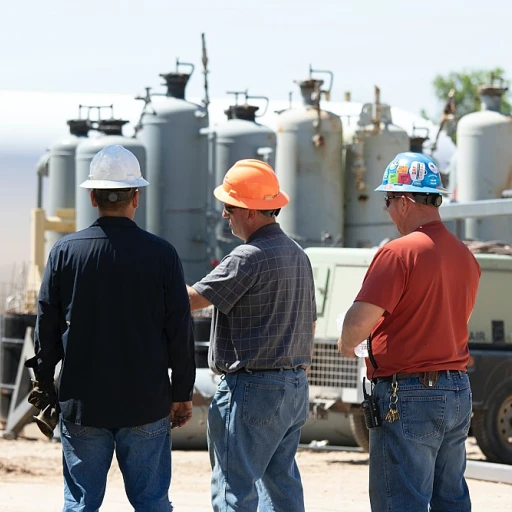-teaser.webp)
Understanding Facilities Management
Delving into the Heart of Facilities Management
Facilities management is an essential component of any organization, focusing on ensuring that everything from buildings, property management, and infrastructure operates smoothly and efficiently. This sector encompasses a wide variety of activities necessary for maintaining and supporting the physical workplace environment, which includes everything from facilities maintenance, health and safety, to the creation of a productive, well-organized working space for employees.
One of the core aspects of facilities management is the management of facility operations. This includes overseeing both the daily duties and longer-term strategic planning. Facilities managers, or facility managers as they are often called, focus on enhancing the user's experience through well-thought-out maintenance management and support services.
In large organizations, a facilities manager might join a management team to collaborate directly with a director of facilities. These directors often play a crucial role in formulating privacy and cookie policies relevant to the facility's operations while ensuring compliance with local regulations. The intricacies of these roles have grown more complex over the years, as a variety of health, safety, and environmental concerns have emerged, making it essential for facilities managers to adapt to changing demands.
Whether you’re an aspiring facilities management manager or looking to understand the breadth of career opportunities available, the right blend of skills, qualifications, and practical experience is crucial. Today’s facilities management landscape in the United States involves dynamic challenges including adapting to sustainability trends and integrating technology to streamline operations over time.
For those considering a full-time role or management jobs in facilities, experience in property management and leading a service-oriented team can be particularly valuable. The roles might range from being an assistant to a full-fledged director, each requiring tailored skills to address specific needs and operations effectively. Embracing these roles can open up diverse career paths and management opportunities within the industry.
Explore innovative approaches to skill development for further insights into navigating these career paths effectively.
The Role of a Facilities Management Manager
The Dynamics of a Facilities Management Leadership Position
In the realm of facilities management, taking on the role of a facilities manager holds significant importance in ensuring the seamless operations of facility services. As a key leader in facility management, a manager needs to possess a keen understanding of both technical and organizational aspects of property management. Their responsibilities include overseeing facility maintenance, coordinating health safety measures, and ensuring that privacy policies and cookie policies align with overall business goals.
To thrive as a manager in this domain, one must navigate various challenges, orchestrating the intricate ballet of time and resources. This includes managing full-time and support staff efficiently, monitoring the allocations of different jobs facilities, and maintaining a proactive approach towards maintenance management. The experience required in handling such a dynamic environment cannot be understated, as it involves continuous interaction with different tiers of the management team and frequent engagement with the director facilities.
Moreover, the facilities manager must be astute in handling budgetary considerations for maintenance while staying up to date with the latest practices in health safety standards, which are imperative for thriving day-to-day operations. Navigating these responsibilities involves more than strong leadership skills; it also requires a pragmatic approach to developing strategic plans for team growth, workforce expansion, and skill development. For insights on mastering skill development in this field, explore strategies to maximize workforce potential and address skills utilization.
While engaging with these various roles, a facilities manager must also cultivate an environment fostering creativity and innovation, thereby maximizing team potential. Such environments not only enhance operational efficiency but are key to sustaining high standards in delivering reliable facility services.
Workforce Planning Challenges in Facilities Management
Overcoming Workforce Planning Challenges in Facility Management
Workforce planning presents unique challenges in the realm of facility management. The field's dynamic nature, coupled with the breadth of responsibilities managed by directors and managers, highlights the need for strategic foresight.
To effectively navigate these challenges, it's essential to understand the various components involved:
- Diverse Range of Services: Covering everything from facilities maintenance to health and safety, the management team is tasked with ensuring all operations run smoothly. This requires a comprehensive understanding of both day-to-day and long-term management objectives.
- Balancing Full-Time and Temporary Jobs: Facilities managers must balance full-time positions with temporary support to maximize efficiency and sustain operations. This balancing act can be complex, particularly when addressing property management and maintenance management tasks.
- Adaptation to Change: Modern facilities management is ever-evolving due to technological advances and changing standards. While this can be stimulating, managers must continuously adapt their strategies, ensuring they align with the latest workforce development planning models and industry trends.
- Location-Specific Challenges: Facility services in a bustling city might differ from those required in a smaller town. Managers in the United States must consider these locale-based influences to make informed staffing decisions.
- Team Dynamics: Overseeing a team of facility management professionals requires not just technical know-how but also leadership skills. Creating a cohesive and motivated team environment under pressure remains a key challenge for directors and manager facilities alike.
By addressing these elements, facilities management professionals can better align their operational goals, effectively implement workforce strategies, and overcome persistent industry challenges.
Skills and Qualifications for Success
The Essential Competencies for Success
In the world of facilities management, possessing the right skills and qualifications can be the difference between a successful career and persistent struggles. At the core, success in facilities management jobs lies in a blend of technical expertise, management acumen, and interpersonal abilities.- Technical Expertise: Facilities managers must have a firm grasp of the technical aspects of property management, facilities maintenance, and operations. This involves understanding maintenance management systems, health and safety compliance, and the principles of facility optimization.
- Management Skills: Facilities management is deeply rooted in efficient and effective management practices. Whether managing a team or overseeing daily operations, one must be able to direct, coordinate, and supervise a diverse group of facility staff effectively. The director facilities or manager facilities roles demand proficiency in management jobs, planning, and delegation.
- Interpersonal Abilities: Engaging successfully with team members, service providers, and stakeholders is vital. Facilities managers often act as intermediaries, ensuring that communication flows smoothly and conflicts are resolved efficiently. Effective communication skills are essential when liaising with a management team or dealing with property management concerns.
- Problem-Solving Capability: The dynamic nature of facilities work entails swift and effective problem-solving. The ability to identify issues, consider possible solutions, and implement the best course of action is invaluable—especially in urgent scenarios, such as dealing with health safety emergencies.
- Adaptability and Continuous Learning: With the facilities management sector continuously evolving, remaining adaptable and committed to lifelong learning is crucial. Facilities managers should consistently endeavor to upgrade their skills, setting aside time day by day to stay abreast of the latest industry trends and technologies.
Career Development and Opportunities
Advancing in Your Facilities Management Career
Exploring career development in facilities management opens the door to a variety of opportunities. Career paths in this field range from entry-level assistant roles to director positions, each requiring a strategic approach to workforce planning and personal skill development. To succeed in management jobs within facilities, gaining comprehensive experience in maintenance and property management is crucial. Managers and directors tend to have a wealth of experience overseeing operations, maintaining health and safety standards, and leading teams. By leveraging these skills, you can aspire to managerial roles such as facilities manager or director facilities. Here's a simple breakdown of how to advance in facilities management:- Gain Entry-Level Experience: Start with assistant positions or support roles to get hands-on experience in facility operations.
- Expand Skills Over Time: Continuously build your expertise in maintenance management, health safety protocols, and effective property management.
- Pursue Certification: Consider certifications in facilities maintenance and management to increase your credibility.
- Network with Industry Professionals: Join industry groups and attend events to stay informed about the latest trends and opportunities in facilities management.
- Seek Managerial Roles: As you gain more experience, explore manager jobs or even directorial positions within the United States or your city.
Future Trends in Facilities Management
Anticipating Changes in the Facilities Management Landscape
The landscape of facilities management is constantly evolving, and staying ahead of trends is crucial for those in management roles to support their teams effectively. Here are some key trends shaping the future of facilities management:- Technological Advancements: The rise of smart technologies and the Internet of Things (IoT) continue to revolutionize the way facilities are managed. These advancements enhance efficiency in maintenance, improve health and safety compliance, and offer better service delivery. Facilities managers and directors must stay informed and adapt to these technological changes to maintain efficient day-to-day operations.
- Sustainability Focus: Environmental sustainability has become a significant focus in facilities management. Many businesses are striving to incorporate eco-friendly practices to reduce their carbon footprint. For property management teams, this means prioritizing green energy solutions and sustainable materials when planning maintenance and operations.
- Remote and Flexible Work: The shift towards remote work has impacted how facilities managers operate. It's crucial to manage the balance between remote and on-site staff efficiently. Directors and managers need to develop strategies that accommodate flexible work arrangements while ensuring operational success and team cohesion.
- Employee Wellbeing: A healthy work environment is vital in maintaining productivity. Facilities managers should focus on creating spaces that promote wellbeing, which could involve reconsidering layout designs, ensuring proper maintenance of indoor air quality, and integrating wellness programs.
- Data-driven Decision Making: Utilizing data analytics in the management of facilities helps in making informed decisions. Director facilities and management teams can leverage data to optimize facility operations, resource allocation, and risk management, ultimately aiming to enhance overall performance.














